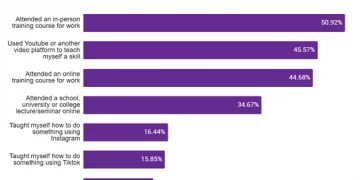
All About Procrastination

Source: Unsplash
Procrastination is part and parcel of the human experience. We all have put off doing something important to “relax” or “think about the task.” Much stems from how our brains are wired for immediate rewards, which enhances survival.
So that you can better understand what is procrastination and how you can control it or even use it to your advantage, we’ve prepared this article. If you are still struggling to overcome procrastination after reading it, seeking professional help or time management training may be worthwhile.
There are numerous ways to beat procrastination, but first, we must understand what it is.
What Is Procrastination?
Procrastination is the act of putting off or delaying something, especially something that requires effort or is unpleasant. In most cases, procrastination is simply a result of laziness or a lack of motivation.
It also occurs from anxiety or fear. People may put off tasks that overwhelm them. Occasional procrastination is normal, but chronic procrastination is detrimental to personal and professional life.
Why Is Procrastination A Problem?
Procrastination becomes a problem when it leads to missed deadlines, poor work quality, and high-stress levels.
When we procrastinate, we often do so because we feel overwhelmed by a task or project. Rather than facing the task head-on, we delay it hoping it will somehow become easier.
However, this usually isn’t the case. The longer we put off a task, the more challenging it becomes. This leads to a cycle of procrastination and poor work performance. It impacts our own lives and can also hurt our careers.
Employers expect us to meet deadlines and produce high-quality work. Failing to live up to these expectations damages our professional reputation and may hinder future career prospects.
However, and despite the negative connotations associated with procrastination, there are situations where it might be beneficial.
For instance, when faced with a difficult task, putting it off to think and strategize seems like a better option. It helps us come up with a better plan or solution. We’ll be looking at similar scenarios later in the article.
Six Types Of Procrastination
There are six primary types of procrastination according to Linda Sapadin and Jack Maguire’s book, It’s About Time!: The Six Styles of Procrastination and How to Overcome. Each has its own distinct causes and effects:
- Task avoidance: It’s the simplest form of procrastination that occurs when an individual simply refuses to start a task. Task avoiders might prefer waiting till the last minute to feel motivated by the stress and pressure present closer to the deadline.
- Decision avoidance: Decision avoidance is similar but occurs when an individual puts off deciding to avoid potential consequences. Avoiders may also put off the decision because they feel they shouldn’t have to work too hard to get what they want. In most instances, this type may have grandiose plans but little action and results.
- Task indecision: Occurs when an individual cannot decide how to approach a task and spends excessive time considering different options. Hesitation stems from committing to many tasks but failing to prioritize and failing in all of them. Indecisive procrastinators fear not living up to their own (and others) impossible standards.
- Escalation of commitment: This happens when an individual persists with a task even though it is clearly not working. This can happen due to sunk cost bias or self-justification. This type may also procrastinate because they feel the task is not worthwhile, forgetting that they’ll still have to do it.
- Rumination: Rumination occurs when an individual fixates on negative thoughts and feelings, which leads them to put off taking action. Fear of failing is the primary driver here. However, not starting is a guarantee of failure.
- Perfectionism: This is perhaps the most dangerous form of procrastination and occurs when an individual believes their work must be perfect to succeed. This can lead to paralysis and prevent individuals from ever completing a task. To perfectionists, failure equals not doing the task perfectly, so why start at all.
Why Do People Procrastinate?
Most people have experienced procrastination at one point or another. Whether it’s putting off cleaning the gutters or avoiding a difficult work project, everyone has put something off because they don’t want to do it. But why do we do this?
There are a few different theories.
One is that we are trying to reduce cognitive dissonance. This is when we have two conflicting ideas in our heads, and by putting off the task, we hope that the situation will resolve itself, so we don’t have to decide.
For example, if you’re considering quitting your job, you might procrastinate on handing in your notice because you’re hoping your boss will fire you first.
We also procrastinate out of self-doubt. We might put off starting a project because we’re unsure if we can do it or because we’re afraid of failure.
Procrastination stems from our inability to deal with negative emotions around a task. It’s our brain’s way of dealing with emotions such as anxiety, self-doubt, resentment, boredom, etc.
Putting off a task offers immediate relief from those emotions. It’s a kind of reward. But, from basic behaviourism, we know that people tend to do more of what they’re rewarded for. The more we procrastinate, the more we’re likely to keep procrastinating.
It becomes a chronic vicious cycle of putting things off and experiencing more negative emotions around a task.
Unfortunately, chronic procrastination affects all aspects of our lives, including productivity, and mental and physical health. It may lead to low life satisfaction, chronic stress, depression, hypertension, etc.
At its root, procrastination is about emotions and not productivity or time management. Therefore, dealing with it requires delving deep into our minds.
Five Ways To Deal With Procrastination

Source: Unsplash
To overcome procrastination, you cannot rely on future rewards or consequences to motivate yourself in the present. Human brains are ill-wired to deal with consequences far off in the future in place of immediate survival.
So, how do you trick your brain into considering future rewards and consequences? By making them more immediate. Here are several strategies that may help:
1. Cultivate Self-Compassion
Self-compassion is the habit of treating ourselves with kindness and understanding in the face of mistakes.
In a 2012 study, scientists found a link between stress, self-compassion and procrastination.
The study showed that procrastinators have higher stress levels and low self-compassion, demonstrating that self-compassion might provide “a buffer against negative reactions to self-relevant events.”
Studies also associate self-compassion with motivation and personal growth, both critical in dealing with procrastination.
2. Make Procrastination Consequences More Immediate
Make the consequences of procrastination more immediate by having some skin in the game. That means you pay the price now if you don’t do something.
For instance, you can use an accountability partner to keep you in check. Alternatively, online services like Stickk will donate on your behalf to a charity you really hate if you don’t do what you say you’ll do.
3. Reward Yourself Immediately For Taking Action
Our brains function on a reward system. The more immediate the reward after action, the more likely we will repeat it.
The rewards of long-term actions aren’t always immediate. This makes our brains undervalue taking any action on them by procrastinating.
Making the benefits of long-term actions more immediate tricks our brains into performing those actions. We can do this through a method known as “Temptation bundling.”
When bundling, you combine a good long-term behaviour with another that feels good in the short run.
For instance, getting a pedicure while processing overdue work emails or exercising while listening to your favourite podcast.
4. Break Down The Task
The friction of starting a behaviour usually leads us to procrastinate. Reducing that friction can help us deal with unpleasant tasks and beat procrastination.
A common trick is to use the 2 Minute Rule. It states that:
“When you start a new habit, it should take less than two minutes to do.”
Put another way, breaking down a task and only focusing on the next step removes the barrier to starting and provides the necessary momentum to carry through.
5. Plan Your Future Actions
Designing our future actions removes the friction we associate with starting a task.
For instance, if you spend too much time on social media, uninstalling those apps from your phone solves the problem.
The concept applies to tasks such as setting up automatic transfers from your checking account into an emergency fund.
Seven Practical Methods To Deal With Procrastination
There are several practical methods to stop procrastinating in your day-to-day life:
- Break down tasks. Make a list of the tasks you need to do, and then break them down into smaller, more manageable steps.
- Set a deadline for each task, and make sure you stick to it.
- Get rid of distractions in your environment (e.g., turn off your television or music, put away your phone, etc.).
- Set yourself a goal for each day, week, or month, and work towards it systematically.
- Use positive reinforcement techniques, such as rewarding yourself when you complete a task on time.
- Consider the next steps even when you don’t plan on taking them immediately. Doing so helps calm the nerves and makes the task seem doable.
- Cultivate curiosity by being aware of your thoughts and feelings the moment you’re procrastinating. This makes them clearer and helps you deal with them.
Positive Interpretations Of Procrastination
It’s 4:00 p.m. on a Friday, and you’re struggling to focus on your work. Your mind keeps wandering to the weekend ahead, and you can’t seem to muster up the energy to finish your project. Sound familiar? If so, you’re not alone.
According to a recent survey, 26 per cent of workers consider themselves “chronically procrastinating”. While it may seem counterintuitive, there are actually some benefits to procrastination.
For one, it can help to increase motivation and productivity. How? The key is to harness the power of procrastination and use it to your advantage.
Here’s how it works: By putting off a task until the last minute, you create a sense of urgency to help you focus and get the job done more quickly. Of course, this only works if you can stay disciplined and not let procrastination become a habit.
Some experts think that procrastination can be harnessed and used as a tool to increase productivity. There are a few reasons:
- Procrastination eliminates unnecessary tasks. After putting off some tasks, you may realize they are no longer necessary or relevant.
- It makes you more creative. When not actively working on the task you’re procrastinating on, your subconscious mind is making connections and figuring out ideas to prepare you for the project.
- Helps you make better decisions. By putting off taking action now, you create time to consider all available options and make better choices when the deadline arrives.
- Active procrastination helps you get more things done. While procrastinating on a big task, you may get the smaller ones done to ” clear the way”. In the end, you have no other option but to tackle the big project.
Conclusion
The key to fighting procrastination is to understand why you’re procrastinating in the first place.
Are you feeling overwhelmed by the task at hand? Is it something that you don’t enjoy or are not interested in? Once you identify the source of your resistance, you can begin to take steps to address it, as discussed in this article.
Bottom line: Don’t beat yourself up. By understanding and managing your tendencies toward procrastination, you can learn to use them to your advantage.
Looking for more tips on Time Management? Check out our article here on Delegation and how it can make you time!


